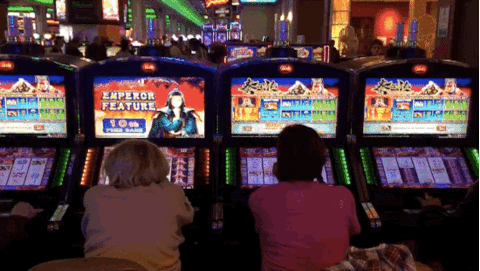It starts innocently enough: you download a trading app, curious to dip your toes into the world of investing. You set up your account and buy a stock, heart racing as your phone lights up with an animated reward.
A day later, another notification buzzes, “Your investment is up 3%! Make your next big move now!” It feels empowering, thrilling even.

Gif by abcnetwork on Giphy
But make no mistake: this isn’t just investing. What you’re experiencing is the result of highly calculated design, and it’s pulling tactics straight from the world of gambling.
As more people turn to apps to manage their money, these platforms are making investing feel less like deliberate strategy and more like a game. Notifications, visual flair, and unpredictable rewards mimic the psychological mechanics of slot machines. As a result they are creating an environment engineered to keep you hooked, distract you from long-term goals, and quietly pad the company’s bottom line.
I dug into the science, spoke to users, and analyzed these addictive practices firsthand. Here’s what I found.
The Psychology of Hooking Users - One Swipe at a Time
Psychologists call it intermittent reinforcement, one of the most powerful forces driving compulsive behavior. It’s the idea that rewards are more addictive when they’re unpredictable, like when you hit the jackpot on a slot machine after dozens of pulls. Casinos have perfected the art, but now trading apps are playing the same game.
Take the way these apps bombard you with tiny dopamine hits: confetti screens after trades, push notifications flaunting gains, clickable pie charts that seem to promise financial success. It’s designed to keep you glued to the app, shot through with excitement or dread, waiting for the next potential high. And as with slot machines, even losses can feel motivating. “Maybe the next trade will make up for it,” many users tell themselves.
Apps that once served as tools for serious investors now blur the line between investing and entertainment. And for some, it’s an expensive blur.
Real People, Real Consequences
One app user I spoke to, Jayden L., shared his story. “At first, I thought it was harmless,” he said. A coworker recommended a popular commission-free platform, and Jayden quickly found himself compulsively refreshing stock charts.
“Every notification felt urgent. One second I was a genius for catching a stock on the rise, the next I was panicking because it dropped, and I’d rush to sell.”
Between the emotional whiplash and constant trading fees, Jayden lost significant money - and his mental well-being took a hit.
This kind of behavior isn’t an accident; it’s a well-choreographed design. The apps exploit both dopamine (your brain’s reward chemical) and fear of missing out (FOMO) to keep users perpetually engaged. Scientific studies on gambling addiction have shown these same forces at play in casino patrons.
The worst part about this, is these apps don’t need you to succeed - they just need you to stay active. The more trades you make, the more they profit, whether you win or lose.
The Subtler Tricks They Don’t Want You to Notice
The tactics don’t stop at notifications and animations. Some apps weave deeper psychological hooks into their features. Here’s how:
1. Gamification Builds a False Sense of Achievement
Ever notice the badges, leaderboards, and “progress bars” in some trading apps? These aren’t tools to help you invest better - they’re ploys to make trading feel like a game where more action equals more success. But real investing success isn't about the number of trades. It’s about patience, planning, and mitigating unnecessary risk.
What to watch for: Features that reward frequent use rather than long-term strategy. If an app feels more like a competitive video game than a financial tool, alarms should go off.
2. Urgent Notifications Trigger Rash Decisions
Trading apps lean heavily on FOMO. Notifications like “Stock X has climbed 5% today!” or “You’re falling behind your peers on the leaderboard!” are crafted to drive an emotional reaction. Urgency creates clicks, and clicks lead to trades (whether or not those trades are smart).
What to watch for: Ask yourself, are these updates genuinely helpful or just noise? If you feel pressured into making a decision, the app is likely manipulating you.
3. Flashing Graphics Stir Emotional Whiplash
Stock prices already swing dramatically enough to stir anxiety in seasoned investors. Add to that flashing graphics, colors, or sound cues that create emotional highs and lows, and you’ve got a potent cocktail for poor judgment.
What to watch for: Does the interface encourage calm, calculated decisions? Or does it amplify big wins and losses with over-the-top effects?
Why This Matters: Investing vs. Gambling
There’s a real danger to the gamification of trading: it turns what should be systematic and intentional into a chaotic free-for-all. Investing apps market themselves as democratizing access to the financial world, but by using casino tactics, they arguably do the opposite. For new investors in particular, this “game” can lead to overtrading, emotional decision-making, and financial loss.
A 2024 study published in Behavioral Finance Quarterly found that apps utilizing gamification features saw more frequent trading from their users, but those same users underperformed the market by a significant margin compared to those who invested through more traditional platforms.
At what cost are these platforms “educating” the next generation of investors?
How You Can Protect Yourself

If you’re using a trading app, there are steps you can take to ensure you stay in control:
Look for Serious Tools: Choose platforms that prioritize education, analysis, and long-term planning over flashy features.
Limit Notifications: Turn off alerts or set specific times to check your portfolio. Don’t let the app dictate your behavior.
Stick to a Plan: Write out your investment goals and strategies (and follow them). Avoid getting swept up in the moment.
Recognize Manipulation: If something feels designed to keep you glued to the app, it probably is. Avoid features that spark unnecessary urgency or competitiveness.
The Question We Have to Ask
Trading apps are positioning themselves as the future of investing, but we need to ask hard questions about the ethics of their design. Should they prioritize user success - or user engagement? Can we really call ourselves investors when the experience feels indistinguishable from pulling the lever on a slot machine?
For now, the responsibility falls on us to stay vigilant and informed. Don’t let the gamification of the market turn you into another player chasing a losing streak. After all, your financial health is not a game.

